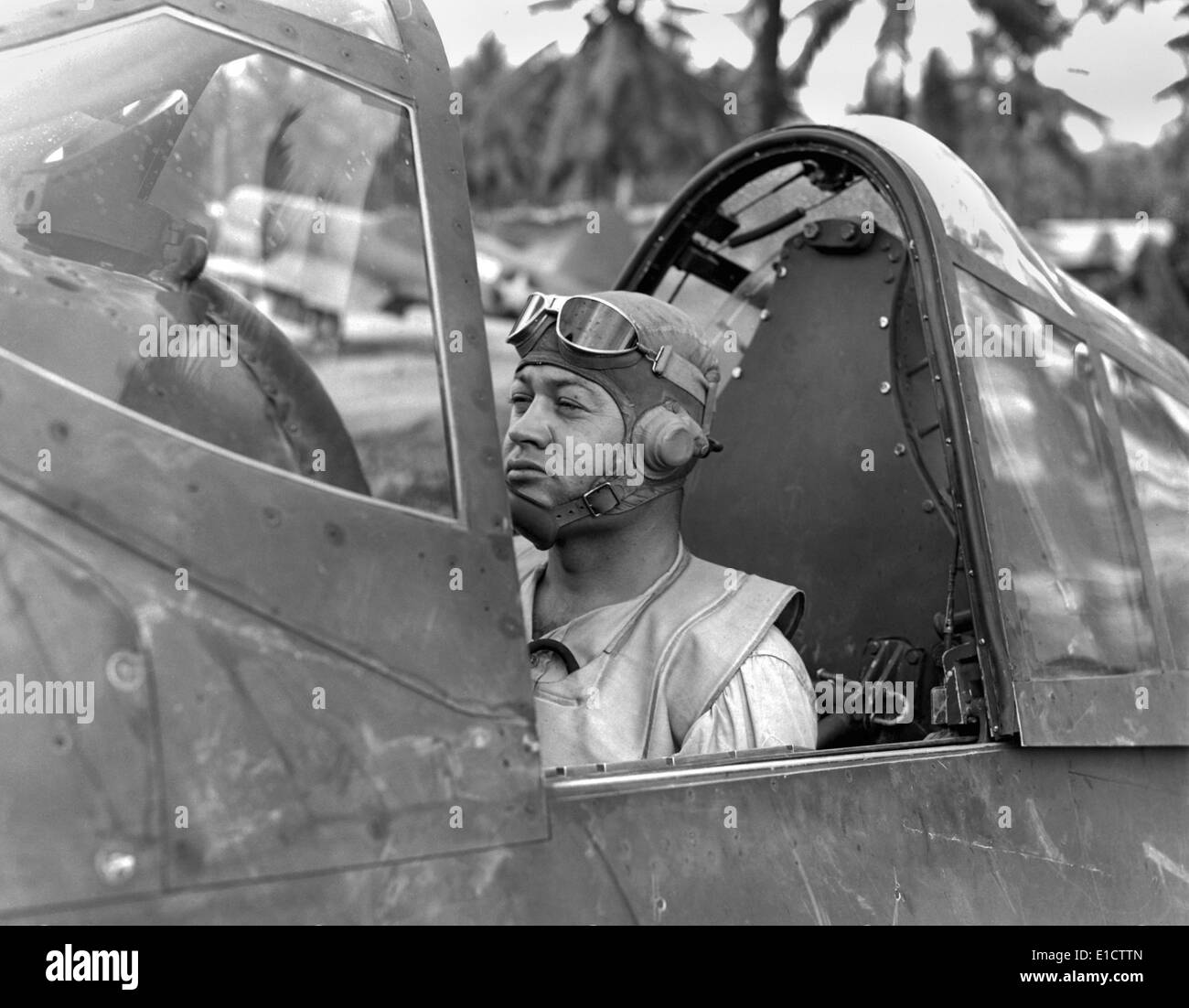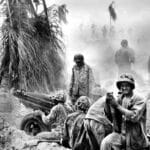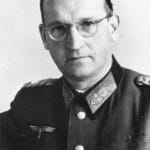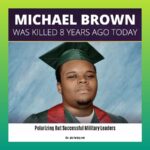Step into the captivating world of Gregory “Pappy” Boyington, a name etched in the annals of World War II aviation. Journey with us as we explore his thrilling military career, from the dizzying heights of aerial combat to his bold leadership of the renowned Black Sheep Squadron. But Boyington’s story is more than just a list of victories. It’s a tale woven with controversy, personal battles, and an unyielding spirit that has puzzled historians for decades. Let’s unlock the enigma of “Pappy” Boyington, examining the questions surrounding his survival, the Black Sheep’s combat record, and his remarkable kill count.
From Troubled Youth to War Hero: The Making of a Legend
Gregory “Pappy” Boyington – the name evokes images of daring dogfights and the undeniable swagger of a World War II fighter ace. But the man behind the Medal of Honor was far more than a fearless pilot. His life was a complex tapestry of soaring triumphs and crushing lows, a testament to both unflinching courage and the struggles of a flawed human being.
Born in 1912, Boyington’s early years were far from idyllic. Growing up in a family grappling with internal conflicts and financial strain, he learned to navigate life’s challenges from a young age. Yet, amidst the turmoil, a passion for flight ignited within him – a passion that would ultimately shape his destiny.
This passion led him to the doors of the Marine Corps in 1941, as the world teetered on the brink of global conflict. Boyington, unaware of the chaos that awaited him, was about to have his skills as a pilot tested in the crucible of the Pacific Theater.
Assigned to the Black Sheep Squadron, Boyington wasn’t your average, by-the-book aviator. He was a maverick, a risk-taker, a leader who inspired his men through unconventional tactics and an undeniable charisma. Under his command, the Black Sheep became one of the most celebrated squadrons in the Pacific, racking up an impressive number of victories against the enemy. Boyington’s skill in the air was undeniable, earning him the coveted title of “ace,” with a confirmed 28 Japanese aircraft shot down.
However, Boyington’s journey was not without turbulence. His rebellious nature, the same spirit that made him a legend, also sparked friction within the ranks. A quick temper and struggles with alcohol, exacerbated by the immense pressure of constant combat, created tension within the squadron he commanded.
Fate dealt Boyington a cruel hand when he was captured, becoming a prisoner of war. For eight grueling months, he endured captivity, a stark contrast to the freedom he found in the skies.
Yet, even captivity couldn’t extinguish Boyington’s spirit. Upon his liberation, his courage and leadership were recognized with the Medal of Honor, a testament to his unwavering resilience.
Life after the war was not a smooth return. The scars of combat, both visible and invisible, lingered. Boyington battled the mental and emotional toll of his experiences, wrestling with addiction and the haunting memories of war.
Through these personal trials, “Pappy” Boyington never forgot his fellow veterans. He became a staunch advocate for their rights, using his platform to fight on behalf of those who had fought alongside him. His autobiography, “Baa Baa Black Sheep,” offered a raw and captivating glimpse into his extraordinary life, later inspiring a popular television series.
Deconstructing the Legend: Kills, Captivity, and Controversy
How Many Kills Did Greg Boyington Really Have?
The legend of Greg “Pappy” Boyington looms large in the history of American fighter pilots. He is officially credited with 28 air-to-air victories, a remarkable feat that solidified his status as an “ace.” However, the fog of war and the passage of time have obscured some details, leading to debate among historians about the precise number of his victories.
Some historians suggest that the actual number of Boyington’s confirmed kills might be slightly lower, perhaps between 22 and 26. They point to inconsistencies in wartime record-keeping and incomplete documentation as reasons for these discrepancies. The chaos of aerial combat, with its split-second decisions and challenges in confirming kills, makes it difficult to achieve absolute certainty. boyington pappy
Despite the ongoing debate, what remains undisputed is Boyington’s exceptional skill as a pilot and the inspirational leadership he displayed, particularly during his time with the famed “Black Sheep” squadron. His contributions to military aviation and his unwavering advocacy for veterans continue to shape his legacy as a true American hero.
Did Pappy Boyington Survive the War?
Against the odds, Pappy Boyington did survive the war, returning home a true American hero. But his path to survival was fraught with peril. In 1944, during a fierce dogfight, Boyington’s plane was shot down, forcing him to ditch into the Pacific Ocean. Captured by the Japanese, he spent the remainder of the war as a prisoner.
The conditions in Japanese POW camps were notoriously brutal, testing the limits of human endurance. Yet, Boyington refused to succumb to despair. He clung fiercely to hope, drawing strength from the camaraderie of his fellow prisoners. His resilience in the face of such adversity became a beacon of inspiration for those who shared his captivity.
When liberation finally came in 1945, Boyington returned to a hero’s welcome, his bravery recognized with the Medal of Honor, the highest military distinction. But his story didn’t end there. Boyington continued to serve his country, becoming a vocal advocate for veterans’ rights and a passionate supporter of aviation.
Pappy Boyington’s life is a testament to the indomitable nature of the human spirit. He reminds us that even in the darkest of circumstances, hope can endure, and courage can prevail. His legacy continues to resonate, inspiring generations with his grit, determination, and unwavering patriotism.
How Many Planes Did the Black Sheep Squadron Really Shoot Down?
The legend of Pappy Boyington and his Black Sheep Squadron is forever intertwined with tales of daring aerial exploits. Officially, the squadron is credited with an impressive 97 enemy aircraft destroyed. However, as with many aspects of Boyington’s story, the exact number remains a subject of debate among historians.
Some researchers argue that the true number of confirmed kills for the Black Sheep Squadron is likely lower, estimating somewhere between 22 and 26. They cite the inherent difficulty of accurately tracking aerial victories during the chaos of wartime, along with the potential for exaggeration and human error in record-keeping.
It’s important to acknowledge that reconstructing events from decades past, especially amidst the fog of war, presents significant challenges. While the precise number of enemy planes downed by the Black Sheep Squadron might forever remain a mystery, the impact of Boyington and his squadron on military aviation is undeniable. Their story continues to captivate historians and aviation enthusiasts, reminding us of the bravery and sacrifice of those who fought in the skies above the Pacific.
The Enduring Legacy of Gregory “Pappy” Boyington
Gregory “Pappy” Boyington was more than just a skilled pilot; he was a complex individual who navigated a life filled with both remarkable achievements and personal struggles. His wartime experiences, including his capture and the harrowing ordeal of captivity, left an indelible mark on him.
Despite controversies surrounding the exact number of his aerial victories, Boyington’s contributions to military aviation and his unwavering patriotism continue to be admired. His leadership of the Black Sheep Squadron, a group often characterized as a collection of misfits, forged a legacy of courage and camaraderie in the face of danger.
Boyington’s story reminds us that heroes are not flawless figures but individuals who rise to challenges, flaws and all. His ability to inspire those around him, both in the air and as a voice for veterans, solidifies his place in the pantheon of American heroes. His legacy continues to inspire, reminding us of the importance of courage, resilience, and an unwavering commitment to serving a cause greater than oneself.















